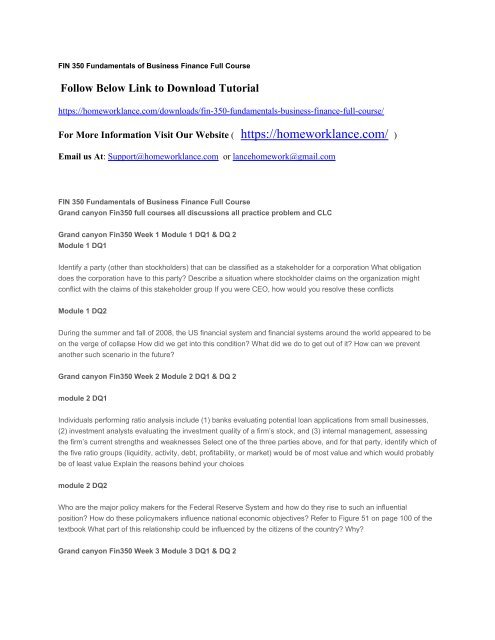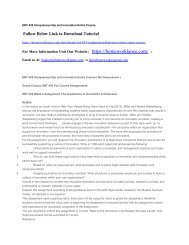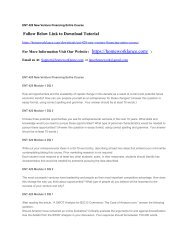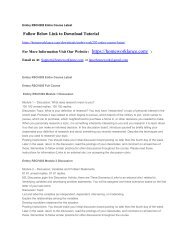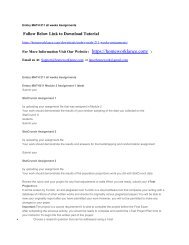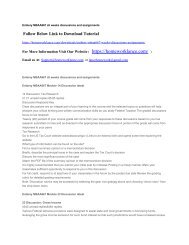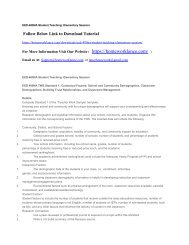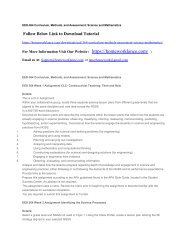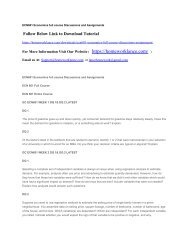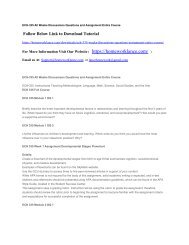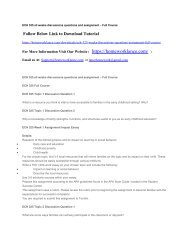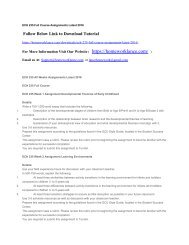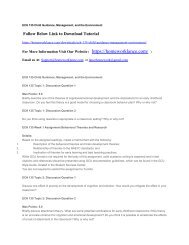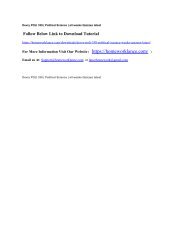FIN 350 Fundamentals of Business Finance Full Course
You also want an ePaper? Increase the reach of your titles
YUMPU automatically turns print PDFs into web optimized ePapers that Google loves.
<strong>FIN</strong> <strong>350</strong> <strong>Fundamentals</strong> <strong>of</strong> <strong>Business</strong> <strong>Finance</strong> <strong>Full</strong> <strong>Course</strong><br />
Follow Below Link to Download Tutorial<br />
https://homeworklance.com/downloads/fin-<strong>350</strong>-fundamentals-business-finance-full-course/<br />
For More Information Visit Our Website ( https://homeworklance.com/ )<br />
Email us At: Support@homeworklance.com or lancehomework@gmail.com<br />
<strong>FIN</strong> <strong>350</strong> <strong>Fundamentals</strong> <strong>of</strong> <strong>Business</strong> <strong>Finance</strong> <strong>Full</strong> <strong>Course</strong><br />
Grand canyon Fin<strong>350</strong> full courses all discussions all practice problem and CLC<br />
Grand canyon Fin<strong>350</strong> Week 1 Module 1 DQ1 & DQ 2<br />
Module 1 DQ1<br />
Identify a party (other than stockholders) that can be classified as a stakeholder for a corporation What obligation<br />
does the corporation have to this party? Describe a situation where stockholder claims on the organization might<br />
conflict with the claims <strong>of</strong> this stakeholder group If you were CEO, how would you resolve these conflicts<br />
Module 1 DQ2<br />
During the summer and fall <strong>of</strong> 2008, the US financial system and financial systems around the world appeared to be<br />
on the verge <strong>of</strong> collapse How did we get into this condition? What did we do to get out <strong>of</strong> it? How can we prevent<br />
another such scenario in the future?<br />
Grand canyon Fin<strong>350</strong> Week 2 Module 2 DQ1 & DQ 2<br />
module 2 DQ1<br />
Individuals performing ratio analysis include (1) banks evaluating potential loan applications from small businesses,<br />
(2) investment analysts evaluating the investment quality <strong>of</strong> a firm’s stock, and (3) internal management, assessing<br />
the firm’s current strengths and weaknesses Select one <strong>of</strong> the three parties above, and for that party, identify which <strong>of</strong><br />
the five ratio groups (liquidity, activity, debt, pr<strong>of</strong>itability, or market) would be <strong>of</strong> most value and which would probably<br />
be <strong>of</strong> least value Explain the reasons behind your choices<br />
module 2 DQ2<br />
Who are the major policy makers for the Federal Reserve System and how do they rise to such an influential<br />
position? How do these policymakers influence national economic objectives? Refer to Figure 51 on page 100 <strong>of</strong> the<br />
textbook What part <strong>of</strong> this relationship could be influenced by the citizens <strong>of</strong> the country? Why?<br />
Grand canyon Fin<strong>350</strong> Week 3 Module 3 DQ1 & DQ 2
Module 3 DQ1<br />
Is it possible for a firm to have a positive pr<strong>of</strong>it and yet have a negative cash flow? Describe a scenario under which<br />
this might occur? Where does the money from pr<strong>of</strong>its go in such a case?<br />
Module 3 DQ2<br />
If you were to examine the cash budgets <strong>of</strong> almost any organization, you would find distinct seasonal patterns <strong>of</strong> cash<br />
inflows and outflows These patterns cause months during the year when almost every business is flush with cash,<br />
and other months in which things are extremely tight Select an organization in which you are (were) employed, and<br />
describe the seasons <strong>of</strong> the year when this firm was flush with cash and the seasons when this firm was typically on a<br />
tight budget Why did these times occur?<br />
Grand canyon Fin<strong>350</strong> Week 4 Module 4 DQ1 & DQ 2<br />
Module 4 DQ 1<br />
One <strong>of</strong> the basic financial principles is that the value <strong>of</strong> any asset (whether it be a stock, a bond, or a firm as a whole)<br />
is the present value <strong>of</strong> that asset’s future cash flows As you learned in this chapter, finding present values requires<br />
determining a discount rate Assume you want to buy a business, and you want to find the present value <strong>of</strong> its future<br />
cash flows Name at least one variable you should consider in determining the correct discount rate to use and explain<br />
its role in discount rate determination If possible, try to identify a variable that has not yet been mentioned by your<br />
classmates<br />
Module DQ 2<br />
Look at the Focus on Ethics box (“How Fair Is Check Into Cash”) in Chapter 5 <strong>of</strong> the textbook These, businesses<br />
quote an interest rate <strong>of</strong> 15% to loan customers (most <strong>of</strong> whom are fairly unsophisticated) and yet the EAR <strong>of</strong> the<br />
loan is close to 400% Explain the wide discrepancy between these rates What do you believe is the correct regulatory<br />
response to these types <strong>of</strong> lenders?<br />
Grand canyon Fin<strong>350</strong> Week 5 Module 5 DQ1 &DQ 2<br />
Module 5 DQ 2<br />
Several stock valuation models were described in the chapter, including zero-growth, constant growth, variable<br />
growth, free cash flow, book value, and P/E multiple models Which <strong>of</strong> these do you believe would generate the most<br />
accurate value estimates for most firms? Explain your choice<br />
Module DQ 1<br />
There is an inverse relationship between interest rate changes and changes in the market price <strong>of</strong> outstanding bonds<br />
Explain the logic behind this principle Given this relationship, do you believe it is currently a good time to buy bonds?<br />
Why or why not?<br />
Grand canyon Fin<strong>350</strong> Week 6 Module 6 DQ1 &DQ 2<br />
Module 6 DQ1<br />
Several stock valuation models were described in the chapter, including zero-growth, constant growth, variable<br />
growth, free cash flow, book value, and P/E multiple models Which <strong>of</strong> these do you believe would generate the most<br />
accurate value estimates for most firms? Explain your choice
DQ 2<br />
Read the Focus on Ethics box (“Psst! Have You Heard Any Good Quarterly Earnings Forecasts Lately?”) Explain<br />
what quarterly earnings guidance is, and what purpose it is supposed to serve If you were a corporate CEO, would<br />
you discontinue this practice? Why or why not?<br />
Grand canyon Fin<strong>350</strong> Week 7 Module 7 DQ1 & DQ 2<br />
DQ 1<br />
Diversification occurs when stocks with low correlations <strong>of</strong> returns are placed together in a portfolio Identify at least<br />
one type <strong>of</strong> firm that might exhibit low correlations <strong>of</strong> returns with the overall stock market? Explain why the<br />
correlations <strong>of</strong> these firms are expected to be low<br />
DQ 2<br />
In general, the cost <strong>of</strong> debt capital is lower than the cost <strong>of</strong> equity capital For this reason, it might be expected that<br />
firms with high debt ratios would have a lower weighted average cost <strong>of</strong> capital Explain at least one reason why this is<br />
not the case<br />
Grand canyon Fin<strong>350</strong> Week 8 Module 8 DQ1 & DQ 2<br />
DQ 1<br />
Which capital investment technique does the discussion in the textbook favor? Why? Do you agree with this<br />
assessment?<br />
DQ 2<br />
Assume your firm has multiple investments to consider each with differing risk levels How can differing risk levels be<br />
incorporated into NPV analysis? How can they be incorporated into IRR analysis?<br />
clc assignment<br />
This is a CLC assignment<br />
Read the Track S<strong>of</strong>tware case (Integrative Case 2) in your textbook and answer questions a-g at the end <strong>of</strong> the case<br />
The case is cumulative and incorporates concepts learned throughout the course Keep the following in mind as your<br />
complete the assignment:<br />
<br />
Unless otherwise noted by your instructor, each question is worth 10 points<br />
In question b, calculate EPS for each year 2009-2015<br />
<br />
In question d, make sure to include each ratio listed in Table 5 <strong>of</strong> the case for both 2014 and 2015 You will<br />
<br />
<br />
<br />
have to calculate the 2015 ratio values<br />
For question d, you are required to write an evaluation <strong>of</strong> each area <strong>of</strong> performance as part <strong>of</strong> your answer<br />
Merely citing numerical ratio values will not earn full Error! Hyperlink reference not<br />
validhomeworkminutescom/question/view/110206/Grand-canyon-Fin<strong>350</strong>-Week-6-Module-6-CLC-Integrative-Case-<br />
Latest-2015#”>credit<br />
Note that your answers for questions f and g do not necessarily match<br />
Answer all questions on an Excel spreadsheet using the same guidelines for spreadsheet development used for your<br />
homework assignments See “Guidelines for Developing Spreadsheets” for a full description <strong>of</strong> additional<br />
requirements<br />
Submit a single spreadsheet file for this assignment, do not submit multiple files
Answer each question on a different spreadsheet tab<br />
Label all numbers, both variables and the final answer<br />
Use the yellow highlighter on Excel’s top menu bar to highlight your final answer<br />
This assignment uses a grading rubric Instructors will be using the rubric to grade the assignment; therefore, students<br />
should review the rubric prior to beginning the assignment to become familiar with the assignment criteria and<br />
expectations for successful completion <strong>of</strong> the assignment<br />
You are not required to submit this assignment to Turnit<br />
practices problems<br />
Grand canyon Fin<strong>350</strong> Week 1 Module 1 Practice Problems<br />
Complete the following problems from the textbook:<br />
Chapter 1, P1-2<br />
Chapter 2, P2-4, P2-6, and Integrative Case 1<br />
Follow these instructions for completing and submitting your assignment:<br />
1. Do all work in Excel Do not submit Word files or *pdf files<br />
2. Submit a single spreadsheet file for this assignment Do not submit multiple files<br />
3. Place each problem on a separate spreadsheet tab<br />
4. Label all inputs and outputs and highlight your final answer<br />
5. Follow the directions in “Guidelines for Developing Spreadsheets”<br />
You are not required to submit this assignment to Turnitin<br />
Grand canyon Fin<strong>350</strong> Week 2 Module 2 Practice Problems<br />
Complete the following problems from chapter 3 in the textbook:<br />
P3-3<br />
P3-6<br />
P3-10<br />
P3-16<br />
P3-18<br />
P3-20<br />
P3-21<br />
Follow these instructions for completing and submitting your assignment:<br />
1. Do all work in Excel Do not submit Word files or *pdf files<br />
2. Submit a single spreadsheet file for this assignment Do not submit multiple files<br />
3. Place each problem on a separate spreadsheet tab<br />
4. Label all inputs and outputs and highlight your final answer<br />
5. Follow the directions in “Guidelines for Developing Spreadsheets”<br />
You are not required to submit this assignment to Turnitin<br />
Grand canyon Fin<strong>350</strong> Week 3 Module 3 Practice Problems<br />
Complete the following problems from chapter 4 in the textbook:<br />
P4-5<br />
P4-6<br />
P4-9<br />
P4-15
P4-18<br />
Follow these instructions for completing and submitting your assignment:<br />
1. Do all work in Excel Do not submit Word files or *pdf files<br />
2. Submit a single spreadsheet file for this assignment Do not submit multiple files<br />
3. Place each problem on a separate spreadsheet tab<br />
4. Label all inputs and outputs and highlight your final answer<br />
5. Follow the directions in “Guidelines for Developing Spreadsheets”<br />
You are not required to submit this assignment to Turnitin<br />
Grand canyon Fin<strong>350</strong> Week 4 Module 4 Practice Problems<br />
Complete the following problems from chapter 5 in the textbook:<br />
P5-2<br />
P5-6<br />
P5-14<br />
P5-22<br />
P5-29<br />
P5-39<br />
Follow these instructions for completing and submitting your assignment:<br />
1. Do all work in Excel Do not submit Word files or *pdf files<br />
2. Submit a single spreadsheet file for this assignment Do not submit multiple files<br />
3. Place each problem on a separate spreadsheet tab<br />
4. Label all inputs and outputs and highlight your final answer<br />
5. Follow the directions in “Guidelines for Developing Spreadsheets”<br />
You are not required to submit this assignment to Turnitin<br />
Grand canyon Fin<strong>350</strong> Week 5 Module 5 Practice Problems<br />
Complete the following problems from chapter 6 in the textbook:<br />
P6-5<br />
P6-11<br />
P6-17<br />
P6-18<br />
P6-22<br />
Follow these instructions for completing and submitting your assignment:<br />
1. Do all work in Excel Do not submit Word files or *pdf files<br />
2. Submit a single spreadsheet file for this assignment Do not submit multiple files<br />
3. Place each problem on a separate spreadsheet tab<br />
4. Label all inputs and outputs and highlight your final answer<br />
5. Follow the directions in “Guidelines for Developing Spreadsheets”<br />
You are not required to submit this assignment to Turnitin<br />
Grand canyon Fin<strong>350</strong> Week 6 Module 6 Practice Problems<br />
Complete the following problems from chapter 7 in the textbook:<br />
P7-2<br />
P7-8<br />
P7-10
P7-14<br />
P7-17<br />
P7-19<br />
Follow these instructions for completing and submitting your assignment:<br />
1. Do all work in Excel Do not submit Word files or *pdf files<br />
2. Submit a single spreadsheet file for this assignment Do not submit multiple files<br />
3. Place each problem on a separate spreadsheet tab<br />
4. Label all inputs and outputs and highlight your final answer<br />
5. Follow the directions in “Guidelines for Developing Spreadsheets”<br />
You are not required to submit this assignment to Turnitin<br />
Grand canyon Fin<strong>350</strong> Week 7 Module 7 Practice Problems<br />
Complete the following problems from chapter 8 in the textbook:<br />
P8-9<br />
P8-14<br />
P8-27<br />
Complete the following problems from chapter 9 in the textbook:<br />
P9-5<br />
P9-7<br />
9-9<br />
P9-10<br />
P9-17<br />
Follow these instructions for completing and submitting your assignment:<br />
1. Do all work in Excel Do not submit Word files or *pdf files<br />
2. Submit a single spreadsheet file for this assignment Do not submit multiple files<br />
3. Place each problem on a separate spreadsheet tab<br />
4. Label all inputs and outputs and highlight your final answer<br />
5. Follow the directions in the “Guidelines for Developing Spreadsheets”<br />
You are not required to submit this assignment to Turnitin<br />
Grand canyon Fin<strong>350</strong> Week 8 Module 8 Practice Problems<br />
Complete the following problems from chapter 10 in the textbook:<br />
P10-4<br />
P10-10<br />
P10-11<br />
P10-15<br />
P10-21<br />
P10-24<br />
Follow these instructions for completing and submitting your assignment:<br />
1. Do all work in Excel Do not submit Word files or *pdf files<br />
2. Submit a single spreadsheet file for this assignment, do not submit multiple files<br />
3. Place each problem on a separate spreadsheet tab<br />
4. Label all inputs and outputs and highlight your final answer<br />
5. Follow the directions in the “Guidelines for Developing Spreadsheets” located in the <strong>Course</strong> Materials<br />
You are not required to submit this assignment to Turnitin


